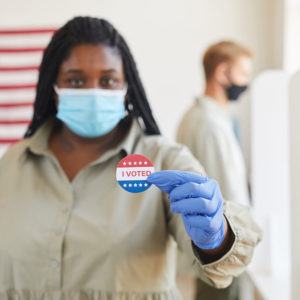This year’s election proved that the “Shining City on the Hill” is in need of repair. The voting process was chaotic, confusing and exacerbated the suspicion about fraud.
We can do better.
Many voters for President Trump believe that the election was rigged even though there is no supporting evidence. The president repeatedly saying that the election was stolen makes a bad situation worse.
If we are going to avoid an even worse future, serious initiatives need to be undertaken to rebuild confidence in government and the election process. Without that confidence, any election system will be vulnerable to claims of fraud.
After the 2012 election, President Obama appointed a Presidential Commission on Election Administration. Its recommendations covered voter registration, voter roll accuracy, access to polls, management of polling places, standard setting and certification of voting technology.
Like most commission reports, it just gathers dust. In 2019, the House passed a partisan reform bill that went into the Senate’s black hole.
This time could be different.
After January 20, President Biden and Congress should create a bipartisan Commission on Elections structured like the Base Realignment Commission (BRAC) of 2005 with recommendations either accepted or rejected.
It could be chaired by former presidents Bush and Obama and consist of people known for their integrity, gravitas and intelligence. The chair and vice chair of the National Governors Association should be members. Membership should also include individuals who can add a regional perspective to its deliberations.
Article 1, Section 4 of the Constitution empowers states to determine “…Times, Places and Manner of holding Elections for Senators and Representatives… but the Congress may… make or alter such Regulations.”
Congress governs federal elections and uses the systems adopted by the states. Although any commission is constrained by the Constitution, there are opportunities for collaboration. It’s just a matter of being realistic and employing incentives for state cooperation.
What are some areas that should be explored?
Candidates hustle for bucks almost constantly between elections. We need a serious debate about public financing, at least for presidential elections.
This is complicated as it would be necessary to establish criteria for eligibility and compensate for the benefit of incumbency. There is also the issue of protecting the free speech rights of PACs, political parties, corporations, etc.
One way is to require total transparency in advertising, including credible documentation of content.
Should there be a national voter registry that creates a database and voter identification card that is used by states? Would requiring states participation be consistent with Article 1? Building a database and keeping it accurate would be challenging but shouldn’t be impossible.
Although the Constitution prohibits the federal government from telling states how to organize their elections, it does not prohibit incentives for them to adopt best practices and state of the art technology.
For example, stock owners can vote for shares electronically using a unique identification number. The current state of technology — e.g. blockchain — makes electronic voting easier and more secure. In person or mail-in voting could be used by those who do not want to vote electronically.
Some have proposed that the federal government require that states use bipartisan commissions to establish political boundaries as a way to control gerrymandering.
Whether that would pass constitutional muster is an interesting question but clearly gerrymandering is out of control and has contributed to elected officials whose self-interest is greater than their public interest
Make voting easier No one should face arbitrary political hurdles to vote.
Legislation should be considered that would set standards to deter measures that make voting harder such as prohibiting early voting, eliminating polling locations and promoting a lack of confidence in mail-in voting.
Changing the current voting process and conforming to the Constitution will not be easy and will be opposed by many because of self-interest. But we must do better if we are going to preserve the Founding Fathers vision for our constitutional system.
Harvard’s Election Integrity Project 2019 index, ranked the U.S. at the bottom of Western democracies. The project’s director Pippa Norris observed, “America hasn’t wanted to learn and hasn’t felt the need to learn.”
Learn we must if we want to restore confidence in our elections.

